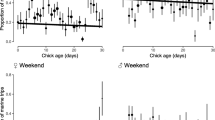Abstract
Analyses of the body masses of Adélie penguins (Pygoscelis adeliae) departing on foraging trips of long and short duration (> and<40 h, respectively) during chick rearing showed that the departure weights of birds prior to long trips were significantly lighter than were those prior to short trips. Penguins, particularly males, were significantly heavier at the start of the guard stage than at the end and both sexes gained similar amounts of body mass during the crèche period. Results support the hypothesis that the foraging effort of Adélie penguins at Béchervaise Island is partitioned between the sexes, with males accepting a net rate of negative energy gain to provide regular meals for their offspring during the guard stage. Adélie penguin foraging behaviour may be driven by a trade-off between the allocation of food to chicks and the storage of parental body reserves, similar to that previously postulated for some species of flying seabirds. The relevance of such a foraging strategy to the breeding success of penguins in the Mawson region of eastern Antarctica is discussed in relation to micronekton distribution in the area.
Similar content being viewed by others
Author information
Authors and Affiliations
Additional information
Accepted: 3 June 2000
Rights and permissions
About this article
Cite this article
Clarke, J. Partitioning of foraging effort in Adélie penguins provisioning chicks at Béchervaise Island, Antarctica. Polar Biol 24, 16–20 (2001). https://doi.org/10.1007/s003000000168
Issue Date:
DOI: https://doi.org/10.1007/s003000000168




